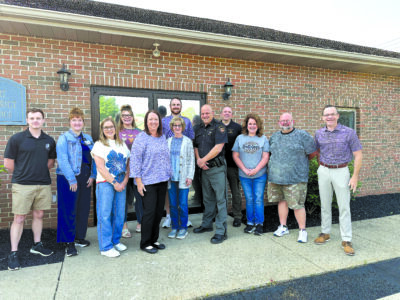How U.S. states have banned, limited or protected abortion
(AP) — The U.S. Supreme Court has overturned Roe v. Wade, the 1973 decision that had provided a constitutional right to abortion.
Friday’s ruling is expected to lead to abortion bans in roughly half the states, although the timing of those laws taking effect varies.
In anticipation of the decision, several states led by Democrats have taken steps to protect abortion access.
The decision also sets up the potential for legal fights between the states over whether providers and those who help women obtain abortions can be sued or prosecuted.
Some Republican-led states will ban or severely limit abortion immediately, while other restrictions will take effect later.
At least one state, Texas, is waiting until after the Supreme Court issues its formal judgment in the case, which is separate from the opinion issued Friday and could take about a month.
Here is an overview of abortion legislation and the expected impact of the court’s decision in the tri-state area:
OHIO
Political control: The Ohio General Assembly is controlled by Republicans who support restricting or banning abortions, and Republican Gov. Mike DeWine backs those efforts. He is up for reelection this year against a former mayor who supports abortion rights.
Background: Under current law, Ohio does not ban most abortions until the 22nd week of pregnancy; after that they’re allowed only to save a patient’s life or when their health is seriously compromised. But the state imposes a host of other restrictions, including parental consent for minors, a required ultrasound, and in-person counseling followed by a 24-hour waiting period. Abortions are prohibited for the reason of a fetal Down syndrome diagnosis. Ohio also limits the public funding of abortions to cases of rape, incest or endangerment of the patient’s life. It limits public employees’ abortion-related insurance coverage and coverage through health plans offered in the Affordable Care Act health exchange to those same scenarios. Clinics providing abortions must comply with a host of regulations.
Effect of Supreme Court ruling: Nothing will change immediately in Ohio. Two trigger bills are on hold in the legislature, but a key legislative leader has said he anticipates needing to write new legislation after the decision is reversed that more carefully reflects the actual ruling. That all but certainly would not happen until lawmakers return to the capital after the November election. Quicker action could take place in the courts, where several Ohio laws restricting abortions have been temporarily blocked. That includes a ban on most abortions at the first detectable fetal heartbeat, as early as six weeks into pregnancy, which is likely to be unblocked and become effective if Roe is reversed.
What’s next: It is not clear what will happen next in Ohio. Activists are considering how to help Ohioans get abortions elsewhere. They may also mount a statewide ballot initiative that would embed the right to an abortion in the state constitution, though that could not happen before next year. Abortion opponents are weighing strategies for imposing a statewide abortion ban.
PENNSYLVANIA
Political control: Republicans who control the Pennsylvania Legislature are hostile to abortion rights, but the state’s Democratic governor is a strong supporter and has vetoed three GOP-penned bills in five years that would have added restrictions beyond the state’s 24-week limit. The race for governor this year could tilt that balance.
Background: Abortion is legal in Pennsylvania under decades of state law, including a 1989 law that was challenged all the way to the U.S. Supreme Court. That produced the landmark Planned Parenthood v. Casey ruling that affirmed the high court’s 1973 decision in Roe v. Wade that legalized abortion nationwide, but also allowed states to put certain limits on abortion access.
Effect of Supreme Court ruling: Gov. Tom Wolf has vowed to protect access to abortion for the remainder of his time in office, through January. Running to replace him is the state’s Democratic attorney general, Josh Shapiro, who supports abortion rights, and Republican state Sen. Doug Mastriano, who has said he supports banning abortion altogether, with no exceptions. The Legislature is expected to remain in Republican hands next year.
What’s next: Legislation to outlaw abortion after the detection of a fetal heartbeat — which can happen at six weeks, before many women even know they are pregnant — has passed a House committee and is awaiting a floor vote. The state Supreme Court is considering a lawsuit filed by Planned Parenthood and other abortion providers aiming to overturn a 1982 law that bans the use of state dollars for abortion, except in cases of rape, incest or to save the life of the mother. In response, Republican lawmakers are advancing a proposed amendment that would declare there is no constitutional right to an abortion in Pennsylvania or to public funding for an abortion.
WEST VIRGINIA
Political control: West Virginia has a legislature controlled by Republicans who want to ban or restrict access to abortions. Gov. Jim Justice, a Republican, opposes abortion access and has signed two anti-abortion laws since taking office in 2017.
Background: West Virginia currently bans abortion after the 20th week of pregnancy unless a patient’s life is in danger, or they face “substantial and irreversible physical impairment of a major bodily function.” Patients seeking abortions must wait 24 hours after undergoing legislatively mandated counseling designed to discourage abortions. A minor who wants an abortion must obtain parental permission. The use of telemedicine to administer a medication abortion is outlawed. The state also bars patients from getting abortions because they believe their child will be born with a disability. The House of Delegates this year passed a 15-week abortion ban, but it died in the Senate.
Effect of Supreme Court ruling: It’s unclear what the effect the ruling will have on abortion access in West Virginia. The state has had a law banning abortion on the books since 1848; under that law, providers who perform abortions can face felony charges and three to 10 years in prison, unless the abortion is conducted to save a patient’s life. In 2018, West Virginia voters approved a constitutional amendment to declare patients do not have the right to abortion and banning state funding for abortions.
What’s next: West Virginia lawmakers could introduce new legislation restricting abortion access when they return to the Capitol in January, but they could return sooner if called into a special session. West Virginia only has one clinic that performs abortions. Women’s Health Center of West Virginia Executive Director Katie Quinonez said if abortion access is outlawed, the clinic will continue to provide reproductive care, such as birth control and sexually-transmitted illness diagnosis and treatment. She said the clinic will help women travel to other states for abortions through its abortion fund.




